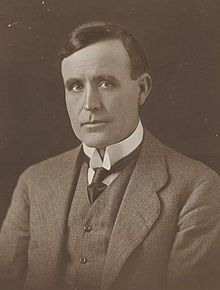William Watt (Australian politician)
|
The Right Honourable William Watt |
|
|---|---|
 |
|
| 24th Premier of Victoria | |
|
In office 18 May 1912 – 9 December 1913 |
|
| Preceded by | John Murray |
| Succeeded by | George Elmslie |
|
In office 22 December 1913 – 18 June 1914 |
|
| Preceded by | George Elmslie |
| Succeeded by | Alexander Peacock |
| Member of the Australian Parliament for Balaclava |
|
|
In office 1914–1929 |
|
| Preceded by | Agar Wynne |
| Succeeded by | Thomas White |
| 5th Speaker of the Australian House of Representatives | |
|
In office 28 February 1923 – 12 January 1926 |
|
| Preceded by | Elliot Johnson |
| Succeeded by | Sir Littleton Groom |
| Personal details | |
| Born |
23 November 1871 Barfold, Victoria, Australia |
| Died | 13 September 1946 (aged 74) Toorak, Victoria, Australia |
| Nationality | Australian |
| Spouse(s) | Florence Carrighan & Emily Helena Seismann |
William Alexander Watt (23 November 1871 – 13 September 1946) was an Australian politician who was the 24th Premier of Victoria, and later a leading federal politician and Speaker of the House of Representatives. He also acted as Prime Minister of Australia from April 1918 until August 1919, during Billy Hughes' service in the Imperial War Cabinet and attendance at the Versailles peace conference.
Watt was born at Barfold, near Kyneton, and was educated at Errol Street State School. He became a newsboy, worked for an ironmongery and a tannery, later as a clerk and an accountant and then went into business as a grain merchant in North Melbourne. He married Florence Carrighan in 1894, but she died in childbirth in 1896. In 1907, he married Emily Helena Seismann and they eventually had five children. He became active in the Australian Natives' Association, a lobby group of Australian-born liberals who supported Australian federation and other causes. He was closely associated with the Victorian liberal leader Alfred Deakin.
In 1897 Watt was elected to the Victorian Legislative Assembly for North Melbourne, defeating Labor's George Prendergast (another future Premier), but at the 1900 election Prendergast recaptured the seat. In 1902 he was returned for the safe liberal seat of East Melbourne, holding that seat until 1904, when he shifted to Essendon. In 1899 he became Postmaster-General in the short-lived government of Allan McLean, then sat out Thomas Bent's government, returning to office under John Murray in 1909 as Treasurer, a post he held until 1912. By that time he was leader of the "urban" faction of the Liberal Party, opposed to Murray's rural-dominated government. When Murray resigned as Premier on 12 May, Watt succeeded him.
...
Wikipedia
